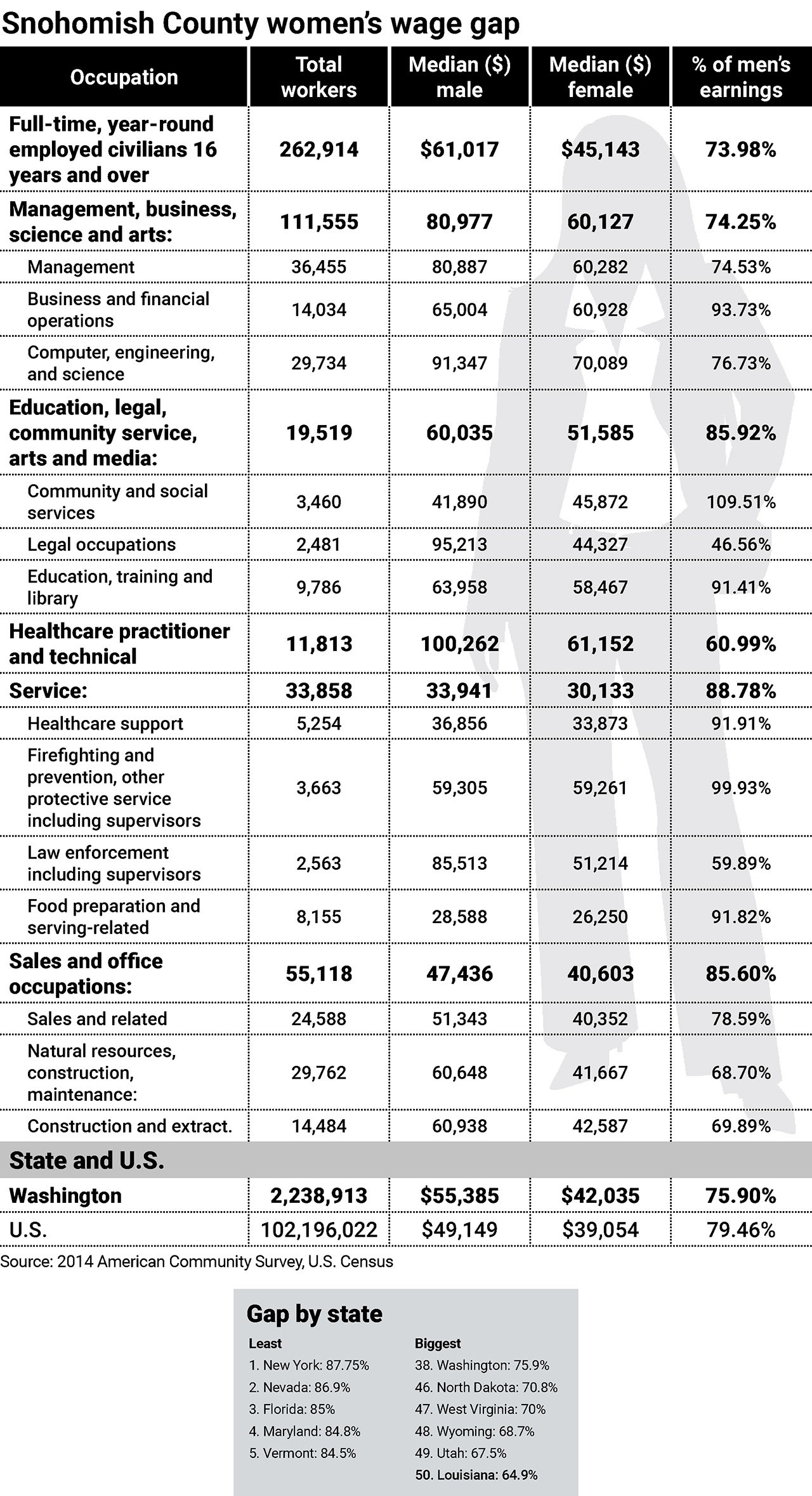Washington has been progressive when it comes to issues that affect women.
More than a century ago, it was one of the first states to grant women the right to vote.
The state also was among the first to elect a woman as governor: Dixy Lee Ray in 1977.
And the state’s top federal officeholders are women, U.S. Sens. Patty Murray and Maria Cantwell.
So that’s why it’s surprising that Washington ranks low on the pay gap between men and women.
Women in full-time jobs in Washington are paid 76 cents on the dollar compared with men, according to the American Community Survey by the Census Bureau in 2014, the most recent year available.
That puts Washington at 38th in the nation, behind states like Mississippi, South Carolina and Texas. Nationally, women are paid 79 cents on the dollar.
Washington lags almost every nearby Western state, including Oregon at 82 cents per dollar made by men, California at 84 cents, and Nevada at 85 cents.
It’s worse in Snohomish County, where women in full-time jobs earn 74 cents on the dollar compared to their male counterparts.
The gap widens even further in the state and the county when all employees, full- and part-time, are added into the mix.
Then, women statewide make about 66 cents on the dollar and 60 cents in the county when looking at all jobs. The majority of part-time jobs are filled by women. Fifty-six percent of minimum wage jobs are filled by women in Washington, according to the National Women’s Law Center.
So why are women paid so low here and elsewhere?
“My refrain — and this isn’t very media-friendly — is that it’s complicated,” said Kevin Miller, a senior researcher with American Association of University Women in Washington, D.C.
One of the first issues that can be looked at is the types of jobs that men do and women do and how those jobs are compensated, he said.
“Truck drivers earn more than child-care workers,” Miller said. “Almost all truck drivers are male and almost all of child-care workers are women.”
This could be an issue in Snohomish County where some of the best-paying jobs are in aerospace, yet women only hold one in four aerospace jobs. This “occupation segregation” is something that women should be aware of when choosing careers, said Julie Anderson, a research associate with the Institute for Women’s Policy Research.
“The days of sort of following your bliss is behind us,” Anderson said “We need to be arming people with information about their earnings potential.”
That doesn’t tell the whole story.
Women are paid less than men when doing like jobs in almost every category, Census data shows. And that’s the part where it’s complicated.
Often times, women hold very different jobs in those categories, he said. And those roles with the company may be compensated differently.
Men also tend to work for decades without taking a break from work, while women tend to take time off for child rearing. And that career interruptus can put women behind in chances to move up the professional ladder.
And then there’s discrimination.
“I think one reason is that employers are still in too many instances either consciously or unconsciously setting salaries based on who is perceived to be the most committed and the most competent on the job,” said Emily J. Martin, general counsel and vice president for Work Place Justice, part of the National Women’s Law Center.
She points to a study published in Scientific American in 2012 in which scientists were given resumes for a student applying for a lab manager position.
Half the scientists were given an application with a male name attached. The other half were given the identical resume with female name attached.
The scientists, both men and women, rated the female candidates lower in competence, hire-ability and whether the scientist would want to mentor the student.
There’s also more conscious discrimination.
Miller points to the Lilly Ledbetter case. She was a supervisor at the Goodyear Tire & Rubber Co. in Alabama who sued the company over discrimination after being paid less than all of her fellow supervisors.
Ledbetter became a symbol of the pay gap issue after the Supreme Court ruled that her equal-pay lawsuit had been filed after the expiration of a statute of limitations.
“It’s difficult to statistically isolate how much of the wage gap is because of discrimination,” Miller said.
Progress in narrowing the wage gap has stalled in the past 10 to 15 years, Miller said. The way to change that would be to institute policy changes, such as creating laws that require mandatory sick leave, paid family leave or increasing the minimum wage, said Martin, with the the National Women’s Law Center.
Washington companies have been at the forefront of attempting to fix the pay gap. Amazon and Expedia, two of the largest corporate giants in the state, have signed onto a White House equal-pay pledge.
Amazon says that women in the company are paid 99.9 percent of what men are paid. Microsoft says that women are paid 99.8 percent of their male counterparts.
And Expedia this summer said men and women at its company are paid equally, but the company needs to do more work in promoting women to leadership positions.
Martin said she is heartened that companies are stepping up and making equal pay an issue. She said that companies also need to work to attract women.
“If a company like Boeing were to commit itself to not just paying men and women the same, but also ensuring that they’re creating pipelines into the field,” Martin said. “Closing the wage gap also requires bringing women into those equal-pay positions.”
Talk to us
> Give us your news tips.
> Send us a letter to the editor.
> More Herald contact information.

























